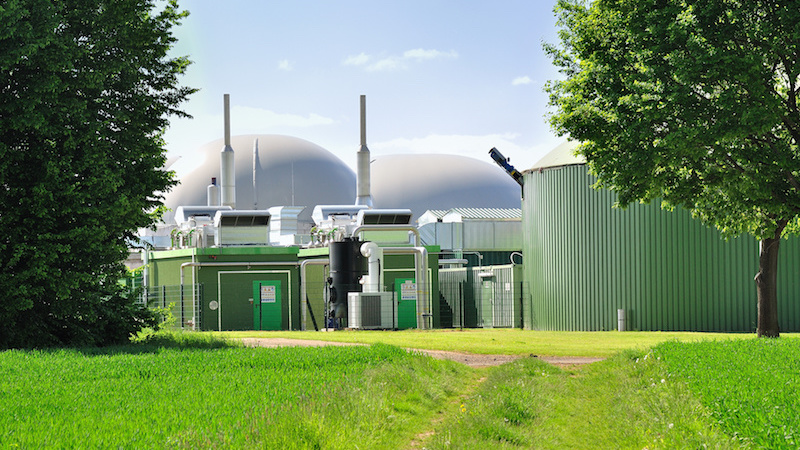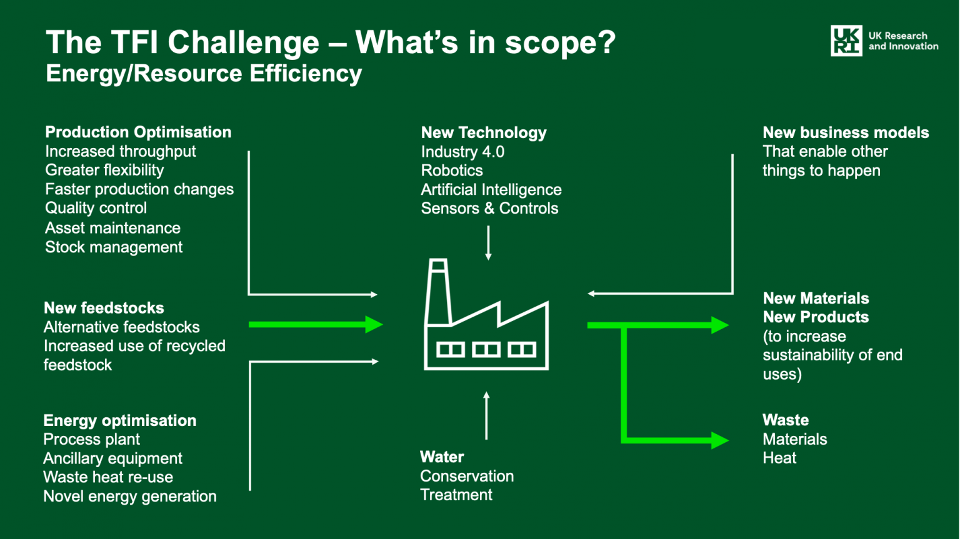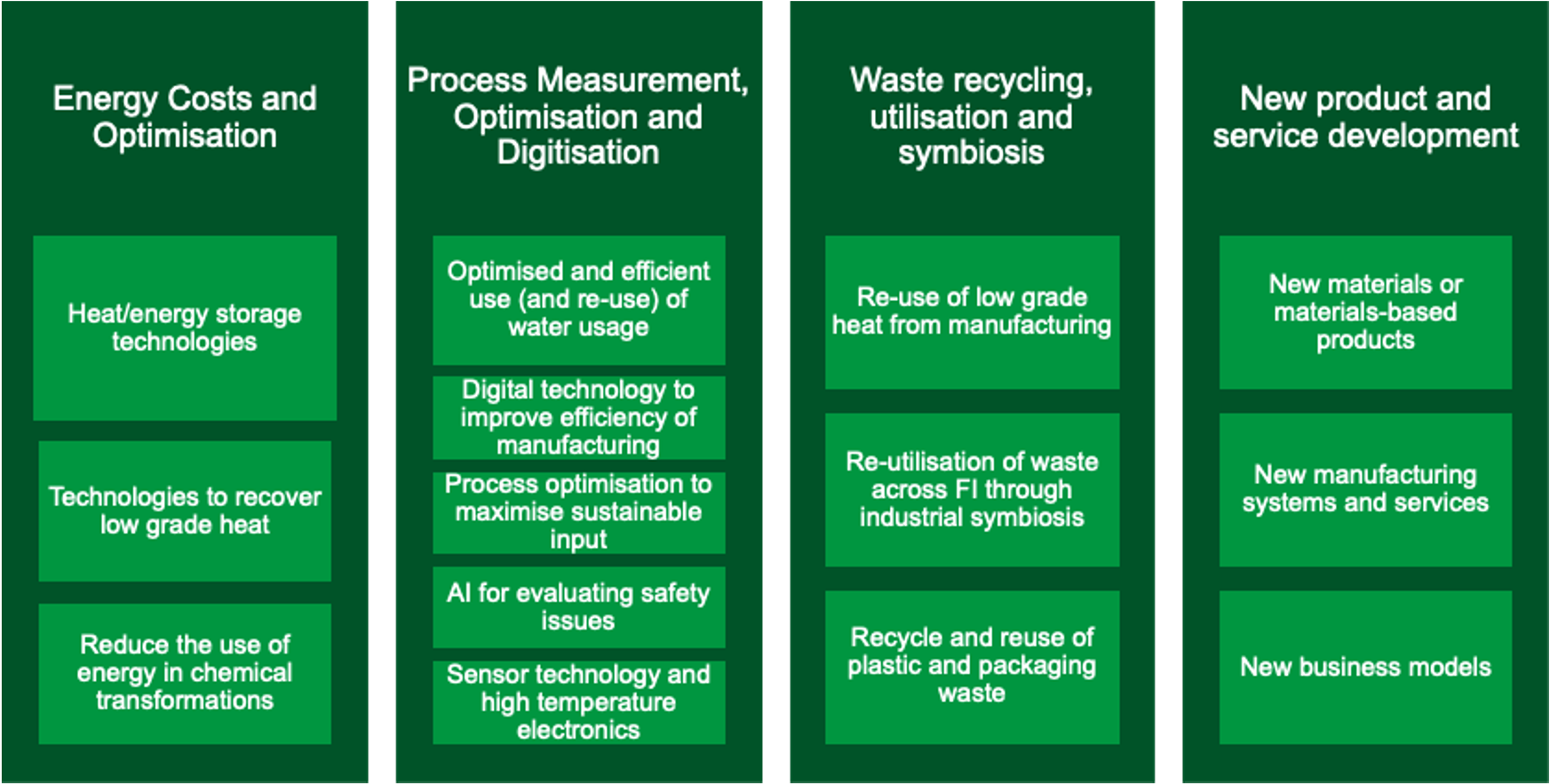What does the Transforming the Foundation Industries (TFI) Challenge mean for the Chemicals Sector?

The foundation industries are worth approximately £45bn to the UK economy and employ 500,000 people. However, these sectors are the largest polluters generating 10% of all UK CO2 emissions. What can be done?
As the capital intensive nature of the industries can make it difficult to adopt new technologies and approaches, the Transforming the Foundation Industries (TFI) Challenge aims to enable these industries to improve productivity and resource and energy efficiencies while maintaining a competitive edge through:
accelerating innovation and new collaborations across sectors addressing sustainability
increasing multi/inter disciplinary research and innovation across sectors.
Priority areas and themes for the TFI challenge are shown in the graphic(s) below.


The chemical sector needs to continually innovate to make step changes in sustainability whilst increasing productivity, resource and energy efficiency. It can do this by increasing throughput, reducing energy costs, waste valorisation, moving to alternative feedstock, process optimisation, low grade heat recovery and industrial symbiosis. All of these are priority areas under the TFI programme, which is why it should be attractive to the Chemicals sector and Enabling Technologies, such as Industrial Biotechnology and Catalysis.
Below is a Q&A which aims to answer some key questions that you may have around the TFI Challenge.
Q. What are the foundation industries (FI’s) included in the ISCF TFI Challenge?
A. Includes Steel, Cement, Glass, Ceramics, Paper and Chemicals
Q. What Chemical industries are included?
A. Essentially all chemicals except oil refining, the production of chemicals directly for fuels and pharmaceuticals. However, if you have a project idea then scope enquiries can be submitted to support@innovateuk.ukri.org. Innovate UK will be happy to provide advice on scope prior to you committing to develop a full proposal.
Q. What are the cross-sector requirements of the competition?
A. TFI competitions will either require or promote cross-sector collaboration between the foundation industries, and the criteria for each competition should be checked. When collaboration is needed, then generally the more collaborative the better – this can be through industrial symbiosis, for example, around alternative feedstock or waste, or even a shared technology. Collaboration with another foundation industry can be as a partner or through contribution-in-kind, and depending on the specific competition details it may be acceptable to only have the collaborative partner conduct their work towards the end of the project.
Although it is worth noting that in these cases it would be expected that foundation industry partner would need to evaluate to demonstrate the innovation benefits to their sectors manufacturing process, conducting some significant work of some substantial material value.
Please check the specific competition requirements and seek advice if needed.
Q. Do the chemical manufacturing processes have to be large or ‘mega’ tonne scale to be included?
A. No, processes don’t have to be large or ‘mega’ tonne scale. However projects need to focus on innovations that lead to step changes in productivity and/or resource efficiency that can demonstrate impact if deployed, especially where the transferable scale-out and scale-up opportunities can lead towards a larger accumulative benefit for the foundation industries. For example, an individual process utilising CO2 can be manufacturing product at small volumes, however the potential exploitation and deployment of new innovations across the UK could produce significant benefits
Q. Do companies need to be part of a cluster?
A. No, if the innovation development can be demonstrated to provide a step change increase in productivity or resource and energy efficiency then it doesn’t need to be part of a cluster. Also refer to the question above about scale of operation.
Q. Are alternative feedstocks within scope?
A. Yes, providing all other scope requirements are also met. Alternative feedstocks include the utilisation of CO2 and other ‘waste’ feedstocks. Note, projects focused solely on carbon capture for storage (rather than utilisation) are out of scope.
Q. Is Industrial Biotechnology (IB) and other enabling technologies in scope?
A. Enabling technologies are in scope. Although any project needs to meet the scope and eligibility criteria, for example, be a cross-sector collaboration. For IB, the focus should be on creating process inputs for the Foundation Industries (FI’s). If IB is valorises wastes from the FI’s that will be targeted to used outside of the FI’s then this will be out of scope. The table below has been created with hypothetical projects to try and illustrate these points. However if you have a project idea you would like to discuss then please contact KTN or contact Innovate UK for a scope check at support@innovateuk.org
Examples of in and out of scope (yes/no):
- Fermentation of yeast to beer and wine – No
- CO2 utilisation: from waste emissions to fish food – No
- CO2 utilisation: from waste emissions to fish food (with collaborative research & development) for use at two FI’s – No
- CO2 utilisation: from waste emissions from a FI to chemicals feedstock – Yes
- Paper wastewater (cellulose) using IB/Biocatalysis for conversion to a platform chemical – Yes
- Valorising wastewater from two FI industries using IB* – Yes (depends on use)
- Converting Methane from a FI process to chemicals using IB – Yes
Q. Can you provide relevant examples of projects funded to date as part of the ISCF Transforming the Foundation industries competitions?
A. Yes. Results and public descriptions of projects winners for the ISCF Transforming Foundation Industries: Fast Start competition can be found on Innovate UK funding competition winners 2020 webpage. Within this document there a couple of useful examples of past applications that were in scope for TFI (please note: the proposals listed in the document have succeeded in the assessment stage of the competition but would have been subject to grant offer and conditions being met).
From the publicly available description, one application was for a project between the chemicals and paper industries looking at the production of a sustainable bio-based chemical, Levulinic acid (LA), by using aqueous streams from the paper industry. The LA could be used as a platform molecule leading to a green solvent or as a precursor for the production of advanced polymers, pharmaceuticals, additives and other commodity chemicals. The project would evaluate the scale-up and techno-economics of microwave assisted catalytic transformation of aqueous biomass containing streams into LA.
Another successful application was between the chemicals and glass industry. The project was to conduct a feasibility study looking at the low cost catalytic conversion of methane to high purity hydrogen for use as a supply to float glass manufacturing. The hydrogen is a by-product from functional carbon production and the project will produce a clean and usable hydrogen alongside high value and usable carbon products. This will enable industrial symbiosis between the foundation industries involved.
Additional Information
If you would like to discuss your challenge, solution and/or project further, please contact our KTN Chemistry & industrial Biotechnology team (direct point of contact: Michael Burnett and Dana Heldt).
Please note that the article and Q&A above are to provide some guidance and is advisory in nature. No warranty, expressed or implied, is given as to the suitability of any given proposal for submission to the funding competitions. Any final decision on scope eligibility remains with Innovate UK. If you would like to discuss you project further or would like to find a partner, then please contact KTN Chemistry and Industrial Biotechnology team. Questions on scope eligibility can be sent to Innovate UK support at support@innovateuk.ukri.org.



